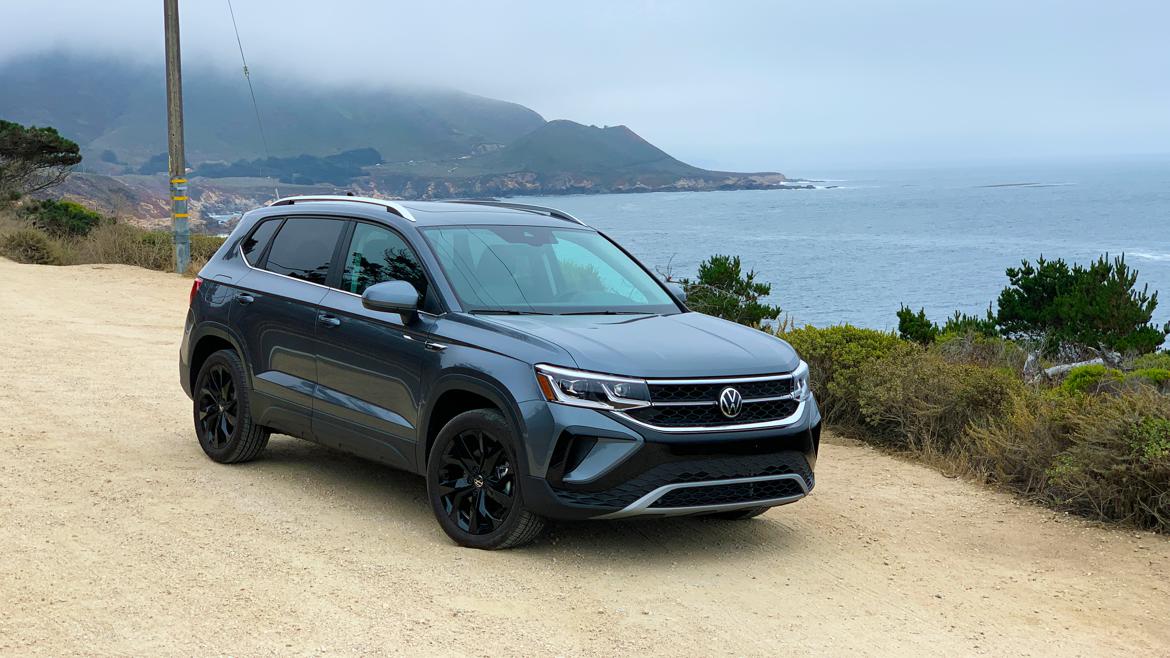Somehow, someway, Volkswagen has fit another small SUV into its lineup, with underpinning from–yep, you guessed it–the ubiquitous MQB platform.
Called the Taos, VW says its latest offering slots under the Tiguan, and comes powered by a 1.5-liter, turbocharged inline-four good for 158 horsepower and 184 lb.-ft of torque.
Three trims are offered–S, SE and SEL–each available with either front-wheel-drive paired to a traditional eight-speed automatic or all-wheel-drive mated to a seven-speed DSG.
We drove the range-topping SEL with front-wheel-drive during our time at Monterey Car Week. Keep reading to get our driving impressions.

Other staff views
Tom Suddard
Publisher
Walk into a VW dealership in the ‘60s asking for a small car, and they’d hand you a Beetle. ‘80s? Here’s your Rabbit, sir, please have a nice day. The 2000s meant droves of Jettas were unleashed into the world, which brings us to the official vehicle of the ‘20s for everybody who just wants to take a Volkswagen badge to work with them: The Taos.
Much has been written about the death of small cars and the rise of crossovers in their place, and I don’t need to rehash that discussion here. Especially since, well, I’m part of the problem: I don’t drive a 3 Series to work every day; I drive my Honda crossover.
These little SUV things are easy to park, carry a fair bit of stuff, drive well enough, and generally make pretty good automotive companions for most people’s day-to-day. The Taos excels in this regard, having plenty of room for four adults to ride comfortably, a nicely packaged interior that folds up to carry a bunch of stuff, and the right size to drive/park/drag itself through a busy life with ease.
Of course, being the most popular size in the most popular segment means competition, and the Taos has plenty of other compact SUVs to beat. There’s the RAV4, CX-5, Rogue, CR-V, Forester, Escape, Sportage, Equinox, Tuscon, Terrain, Tiguan, Kona, Renegade, Cherokee, X3, RDX, Crosstrek, Compass, Macan, XC60, HR-V, CX-30, C-HR, Bronco Sport, Model Y, XC40, Kicks, EcoSport, Stelvio, QX50, GLA, Q5 and probably some more I just can’t remember. And before you nitpick that a few of those aren’t exactly Taos competitors (The Tiguan, for example, is its slightly larger stablemate, while a Renegade is slightly smaller), my point is that the compact SUV segment is so saturated and so competitive, that it’s barely possible to differentiate most of the choices from each other. What used to be two or three logical options—meaning buy a CR-V or buy a RAV4—is now as competitive as the half-ton truck market.
That means differentiating your compact SUV is tough, and the easiest way to do so is to make something truly horrible, like Jeep has, instead of making something nearly perfect, as half a dozen other companies have. The best compact SUVS simply disappear into your life as they quietly make it easier. A few, like the CX-5, manage to do that while adding in some fun. The options from Hyundai have fantastic ergonomics and infotainment systems, which is probably more important than limit handling balance in your day-to-day life, anyway.
Where am I going with all this? Here’s my verdict after a week with the Taos: Volkswagen has built a compact SUV that perfectly averages the other choices in the market. And that’s just not enough in today’s world.
This isn’t a bad car. In fact, it’s quite a good car. But it’s not the best, and I suspect you’ll find Volkswagen buyers choosing this compact SUV, instead of compact SUV buyers choosing this Volkswagen.
Sure, there are some cool features: The digital dash took some getting used to, but feels far more upmarket than its humble roots. The interior, too, feels a bit roomier than the competition. But there are also a few misses: The Taos isn’t fast, but it is tuned so 10% throttle requests 90% of the available torque from a stop, or at least it feels like it.
Multiple drivers, me included, were unable to find the happy medium between “The guy behind me is honking because we’re accelerating too slowly” and “wow this thing does burnouts really easily.” And our Taos felt underdamped in the rear, perhaps a concession aimed towards city ride comfort versus high-speed stability. For a company that’s built some truly great driving cars, the Taos feels like a collection of parts where driving is an afterthought.
If there’s one main argument for the Taos, perhaps it’s the price: A starting MSRP of $22,995 makes a Taos a few thousand dollars cheaper than a RAV4, CR-V or Escape, though our test car stickered at $33,885.
Overall, the Taos is a perfectly viable option, and if you want a compact SUV with a Volkswagen badge, your wish has been granted. If you’re looking for the best option on the market, though, there’s a reason Toyota sells so many RAV4s.
Comments
For me, Volkswagen has been getting it right for a long time. Their product looks awesome and drives awesome. We gave the Atlas a good hard look before we bought the CX-9. It was big enough, it had enough power, etc. etc. But would it be in the shop before it was paid for? There are enough really good vehicles out there competing for your dollars that will give you five or more years worth of absolutely trouble-free miles. Volkswagen's lack of reliability is the only thing that keeps me from buying one.
They killed the Golf Wagon and Alltraks and sell this? Pass. 
My wife saw one of these when having her Tiguan serviced. She was impressed. They were hoping to get her to trade her Tiguan on the spot, but she didn't (thank goodness).
Displaying 1-3 of 3 commentsView all comments on the GRM forums
You'll need to log in to post.





























